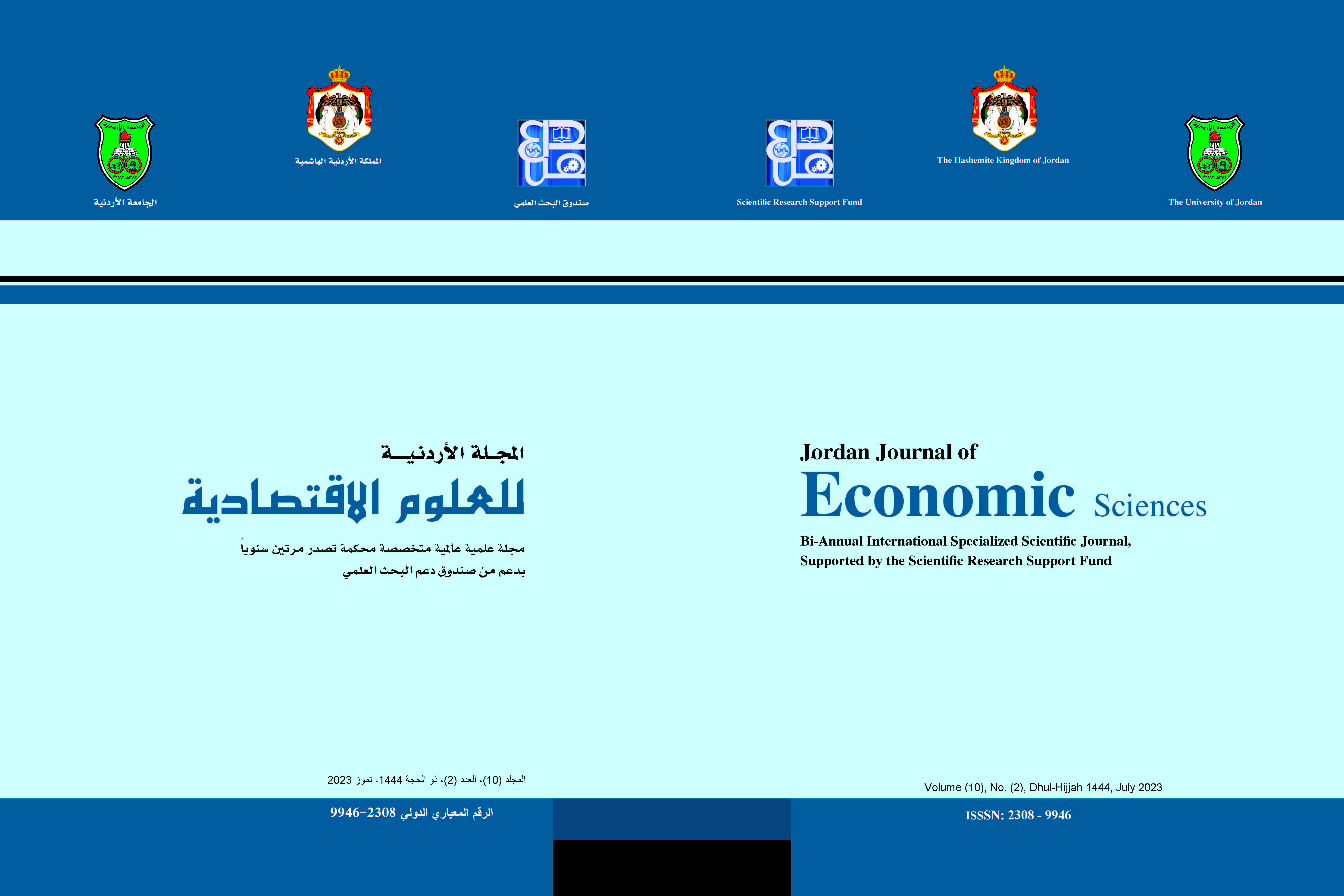The Asymmetric Impact of Energy consumption on economic growth; Empirical Evidence from the Jordanian Economy
DOI:
https://doi.org/10.35516/jjes.v10i2.1402Keywords:
Energy Consumption, Investment (Fixed Capital Formation), Labor Force, Economic Growth, NARDL ModelAbstract
Objectives: This study aims to demonstrate the asymmetric impact of energy consumption on Jordan's economic growth, addressing a range of explanatory variables of economic growth, mainly total energy consumption, total fixed capital formation, and total labor force from 1990 to 2019.
Methods: The study used the autoregressive lagging time lag model in its non-linear form (NARDL) for regression analysis. To achieve this purpose, the unit root test, the Wald-test asymmetry test, the Cointegration test, and a set of model validity tests were used.
Results: The results confirm that economic growth represented by growth in GDP is disproportionately affected by changes in energy consumption. Furthermore, the selected economic variables have had the expected impact in line with economic theory and previous literature.
Conclusions: The study recommended that economic shocks in the energy sector should be considered in the analysis of this relationship, whether positive or reverse in the long and short term, as they are important for decision-makers to limit the impact of such shocks on economic growth.
References
Ahmad, A. U., Ismail, S., Ahmad, I. M., Adamu, I. M., Jakada, A. H., Farouq, I. S., ... & Ibrahim, G. (2020). Pollutant emissions, renewable energy consumption and economic growth: An empirical review from 2015–2019. Journal of Environmental Treatment Techniques, 8(1), 323-335.
Ajlouni, S. A. (2015). Energy consumption and economic growth in Jordan: An ARDL bounds testing approach to co-integration. Jordan Journal of Economic Sciences, 2(2), 143-161.
Akarca, A. T., & Long, T. V. (1980). On the relationship between energy and GNP: a reexamination. The Journal of Energy and Development, 326-331.
AlKhars, M., Miah, F., Qudrat-Ullah, H. and Kayal, A., (2020). A systematic review of the relationship between energy consumption and economic growth in GCC countries. Sustainability, 12(9), p.3845.
Alqaralleh, H. (2021). On the nexus of CO2 emissions and renewable and nonrenewable energy consumption in Europe: a new insight from panel smooth transition. Energy & Environment, 32(3), 443-457.
Altinay, G., & Karagol, E. (2004). Structural break, unit root, and the causality between energy consumption and GDP in Turkey. Energy economics, 26(6), 985-994.
Amran, Y. A., Amran, Y. M., Alyousef, R., & Alabduljabbar, H. (2020). Renewable and sustainable energy production in Saudi Arabia according to Saudi Vision 2030; Current status and future prospects. Journal of Cleaner Production, 247, 119602.
Asghar, Z. (2008). Energy-GDP relationship: a causal analysis for the five countries of South Asia. Applied Econometrics and International Development, 8(1).
Balcilar, M., Bekun, F. V., & Uzuner, G. (2019). Revisiting the economic growth and electricity consumption nexus in Pakistan. Environmental Science and Pollution Research, 26, 12158-12170.
Bayer, C., & Hanck, C. (2013). Combining non‐cointegration tests. Journal of Time series analysis, 34(1), 83-95.
Bekun, F. V., Alola, A. A., & Sarkodie, S. A. (2019). Toward a sustainable environment: Nexus between CO2 emissions, resource rent, renewable and nonrenewable energy in 16-EU countries. Science of the Total Environment, 657, 1023-1029.
Bildirici, M. E., & Gökmenoğlu, S. M. (2017). Environmental pollution, hydropower energy consumption and economic growth: Evidence from G7 countries. Renewable and Sustainable Energy Reviews, 75, 68-85.
Charfeddine, L., & Kahia, M. (2019). Impact of renewable energy consumption and financial development on CO2 emissions and economic growth in the MENA region: a panel vector autoregressive (PVAR) analysis. Renewable energy, 139, 198-213.
Engle, R. F., & Granger, C. W. (1987). Co-integration and error correction: representation, estimation, and testing. Econometrica: journal of the Econometric Society, 251-276.
Esen, Ö., & Bayrak, M. (2017). Does more energy consumption support economic growth in net energy-importing countries?. Journal of Economics, Finance and Administrative Science, 22(42), 75-98.
Granger, C. W., & Yoon, G. (2002). Hidden cointegration. U of California. Economics Working Paper, (2002-02).
Khan, M. K., Khan, M. I., & Rehan, M. (2020). The relationship between energy consumption, economic growth and carbon dioxide emissions in Pakistan. Financial Innovation, 6, 1-13.
Kraft, J. and Kraft, A., (1978). On the relationship between energy and GNP. The Journal of Energy and Development, pp.401-403.
Pesaran, M. H., Shin, Y., & Smith, R. J. (2001). Bounds testing approaches to the analysis of level relationships. Journal of applied econometrics, 16(3), 289-326.
Rafindadi, A. A., & Ozturk, I. (2017). Impacts of renewable energy consumption on the German economic growth: Evidence from combined cointegration test. Renewable and Sustainable Energy Reviews, 75, 1130-1141.
Samuelson, P. A., & Solow, R. M. (1956). A complete capital model involving heterogeneous capital goods. The Quarterly Journal of Economics, 70(4), 537-562.
Shin, Y., Yu, B., & Greenwood-Nimmo, M. (2014). Modelling asymmetric cointegration and dynamic multipliers in a nonlinear ARDL framework. Festschrift in honor of Peter Schmidt: Econometric methods and applications, 281-314.
Stern, D. I. (2019). Energy and economic growth. In Routledge handbook of Energy economics (pp. 28-46). Routledge.
The Arab Energy Development Portal, Total Final Energy Consumption, Electronic Knowledge Platform, Lebanon, Beirut, PO Box 481-11. https://data.arabdevelopmentportal.com/topics/Energy-3/International/
The Jordanian Ministry of Energy and Mineral Resources, annual reports, Amman, Jordan. https://www.memr.gov.jo/AR/List
Toda, H. Y., & Yamamoto, T. (1995). Statistical inference in vector autoregressions with possibly integrated processes. Journal of econometrics, 66(1-2), 225-250.
Topolewski, Ł. (2021). Relationship between energy consumption and economic growth in European countries: Evidence from dynamic panel data analysis. Energies, 14(12), 3565.



